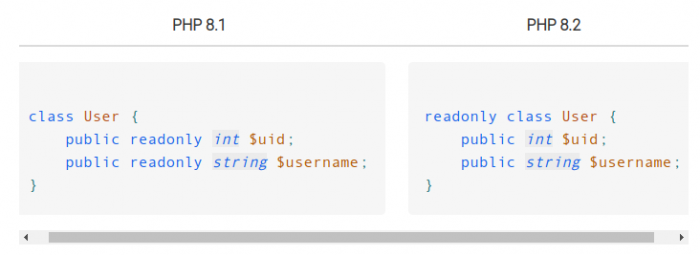PHP 8.2 brings type-system improvements for expressive and fine-grained type-safety, readonly classes, sensitive parameter redaction support, new random extension, and many new features along with several changes to streamline and modernize PHP language.
PHP 8.2 is a key milestone in PHP’s journey in modernizing the PHP language. In addition to the exciting new features and improvements, PHP 8.2 streamlines the language by deprecating support for dynamic class properties, warnings when it encounters certain non-optimal INI configuration values, and fixing some of the legacy PHP behavior that affects how PHP sorts arrays and certain types of string transform/encode operations.
Type System Improvements
PHP 8.2 addresses several shortcomings and restrictions of PHP’s type-system, allowing PHP applications to enjoy better type-safety. This includes adding support for true type, and allowing null and false types to be used as stand-alone types, and support for DNF types.
PHP 8.2 supports Disjoint Normal Form (DNF) types — It is now possible to combine Union Types (PHP 8.0) and Intersection Types (PHP 8.1), making it possible to declare precise and expressive parameter, return, and property types.
function process((HTMLRequest & RequestInterface) | APIRequest $request) {
// ...
}
(HTMLRequest & RequestInterface) | APIRequest type declaration makes sure that the $request value is either an instance of APIRequest, or a class object that implements/extends/instance of both HTMLRequest and RequestInterface.
Support for true and false as stand-alone types makes it possible to replace bool type declarations if the boolean value is always the same.
function alwaysReturnsFalse(): false {}
function alwaysReturnsNull(): null {}
function alwaysReturnsTrue(): true {}
It was already possible to declare nullable types or a Union Type with null in older PHP versions. Since PHP 8.2, declaring null as a stand-alone type is allowed as well:
Readonly Classes
PHP 8.1 added support for readonly properties. A readonly property can only be set once, and PHP actively prevents the value from being modified even from within the scope of the class.
PHP 8.2 takes readonly properties a step further with readonly classes. When a class is declared as readonly, all of its properties are automatically declared readonly. Further, it prevents dynamic properties on readonly classes, and ensures that all properties are typed.
readonly class User {
public string $username;
public string $uid;
}
All properties of the readonly User class are automatically declared as readonly.

New random extension
Over the history of PHP, it supported various Random Number Generators (RNG) with varying degrees of performance, use cases, and fit for secure applications. PHP 8.2 takes it a step further by refactoring all of the RNG-related functionality to a new extension named random.
The random extension provides the same functionality without breaking any APIs, so the existing rand, mt_rand, random_bytes, and random_int functions continue to work with no changes. It also provides a new OOP API to generate random numbers with a pluggable architecture, so it is now easy to mock the RNG and provide new RNGs, making PHP applications secure and easy to test.
Constants in Traits
In PHP 8.2, it is now possible to declare constants in traits. The traits cannot be accessed directly, but these constants become class constants when a class uses the trait.
trait FooBar {
const FOO = 'foo';
private const BAR = 'bar';
final const BAZ = 'baz';
final protected const QUX = 'qux';
}
class Test {
use FooBar;
}
echo Test::BAZ; // 'bar'
This was not allowed in PHP 8.1 and older. Trait constants cannot be accessed directly (i.e. FooBar::FOO is not allowed). The trait constants must also not collide with other traits or the immediate class that uses them.
Sensitive Parameter Value Redaction Support
PHP 8.2 adds a new built-in parameter Attribute named #[\SensitiveParameter] that PHP makes sure to redact the actual value in stack traces and error messages.
Functions that accept passwords, private keys, or otherwise sensitive information can declare the parameters with the #[\SensitiveParameter] attribute. If the function calls within it causes a PHP error or an exception, the actual value passed to that parameter will be replaced with a \SensitiveparameterValue object.
PHP’s built-in functions such as password_hash and password_verify are already declared with the #[\SensitiveParameter] attribute.
function passwordHash(#[\SensitiveParameter] string $password) {
debug_print_backtrace();
}
passwordHash('hunter2');
With the #[\SensitiveParameter] attribute present, all stack traces actively redact the actual value passed to the parameter:
array(1) {
[0]=> array(4) {
["file"]=> string(38) "..."
["line"]=> int(9)
["function"]=> string(3) "foo"
["args"]=> array(1) {
[0]=> object(SensitiveParameterValue)#1 (0) {}
}
}
}
New Functions and Classes
In addition to the major new features, PHP 8.2 also brings a set of new functions and classes:
Parse INI quantity values: ini_parse_quantity
ini_parse_quantity function parses any data size recognized by PHP INI values (such as 56K, 256M, or 1G) and returns the data size in bytes.
ini_parse_quantity('256M'); // 268435456
Maintain a Curl connection alive: curl_upkeep
curl_upkeep function in the PHP 8.2 Curl extension triggers the underlying Curl library to run necessary tasks to keep a Curl connection alive. The most common use case of this function is to keep an HTTP persistent connection (Keep-Alive) alive by periodically calling the curl_upkeep function.
Retrieve Cipher Key Length: openssl_cipher_key_length
In PHP 8.2 OpenSSL, there is a new function named openssl_cipher_key_length that returns the required length of the key (in bytes) for any supported OpenSSL cipher.
This function eliminates the need of hard-coding the required key’s length for OpenSSL cipher operations.
openssl_cipher_key_length("CHACHA20-POLY1305"); // 32
openssl_cipher_key_length("AES-128-GCM"); // 16
openssl_cipher_key_length("AES-256-GCM"); // 32
Reset recorded peak memory usage: memory_reset_peak_usage
PHP 8.2 adds a new function named memory_reset_peak_usage that resets the peak memory usage returned by the memory_get_peak_usage function.
This can be helpful in applications that invoke or iterate an action multiple times, and need to record the peak memory usage of each invocation. Without the ability to reset the memory usage with the new memory_reset_peak_usage function, the memory_get_peak_usage returns the absolute peak memory usage throughout the entire run.
source: PHP Watch




